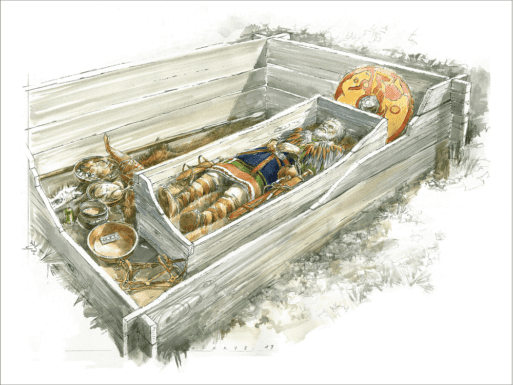
Reopened graves were typically missing select items.
Credit: B. Clarys, Antiquity
Anyone who’s watched Indiana Jones or Lara Croft explore ancient cities to claim buried treasure won’t blink twice at the concept of a grave robber. After all, what else would motivate others to dig up the dead, ransack their tombs, and leave them lying in disarray?
But while archaeologists have long attributed the disturbance of ancient European grave sites to robberies, recent analysis questions this assumption. Researchers synthesized five regional studies to show that the practice, which involved the removal of specific artifacts from re-opened graves, was common from Transylvania to southern England in the late sixth and early seventh centuries. Surprisingly, most of these artifacts were less valuable than nostalgic, suggesting that they were likely sought out by mourners.
“The reopening practices have similarities across Europe,” Alison Klevnäs and Astrid Noterman, two authors of the study, wrote in a January 2022 article for The Conversation. “The choice of swords and brooches, out of all the valuables left with the dead, seems to be related to their roles as heirlooms — possessions used to connect people across generations.” Many of the bones and other objects were still intact when the graves were reentered, suggesting that the disturbance occurred early on in the decomposition process, they said. And other, more valuable, objects were left behind.

Researcher Alison Klevnäs
Credit: Grave Reopening Research
Klevnäs told CNN that while robbing graves could be considered distasteful, reopening them was “socially positive” — allowing loved ones to remain connected to the deceased. Reopening graves after death is not uncommon in some cultures, including Vietnam. Yet the article, published in the journal Antiquity last year, was one of the first to indicate that such practices could have been typical in Europe.
The research suggests “a shared understanding of how to interact with the dead that transcended other cultural boundaries,” Emma Brownlee, an archaeologist at Cambridge University who was not involved in the study, told Live Science. “We’re only just starting to appreciate how interconnected the early medieval world was,” she said.

 Ancient Europeans Likely Reopened Graves for Heirlooms
Ancient Europeans Likely Reopened Graves for Heirlooms


 National Donate Life Month Reminds Us To Give
National Donate Life Month Reminds Us To Give
 How Dare You Die Now!
How Dare You Die Now!
 Debating Medical Aid in Dying
Debating Medical Aid in Dying














